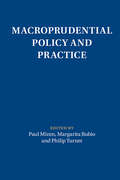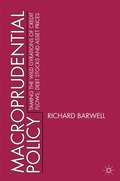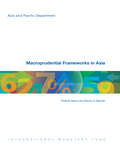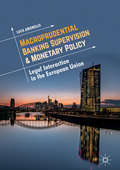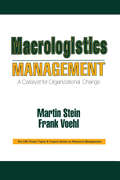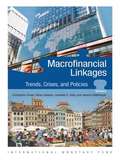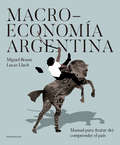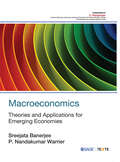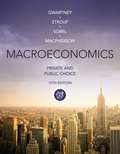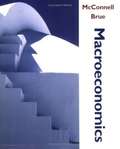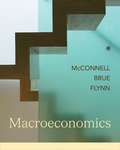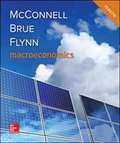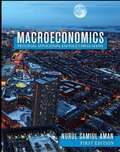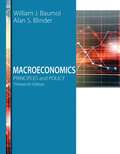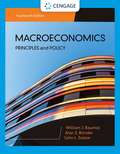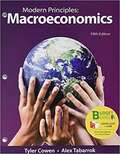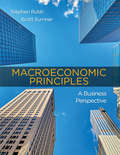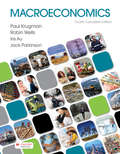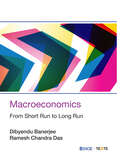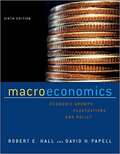- Table View
- List View
Macroprudential Policy and Practice (Macroeconomic Policy Making)
by Paul Mizen Margarita Rubio Philip TurnerMacroprudential policy is perhaps the most important new development in central bank policymaking circles since the global financial crisis, and reliance on such policies has continued to spread. The crisis, which showed the limits of conventional monetary policy as a tool to deal with financial stability, forced a wide-ranging rethink of economic policies, their interactions and their repercussions. It has led to new forms of intervention, of regulation and of supervisory practice. Macroprudential regulation is now one of the most important topics in modern macroeconomics, because it concerns measures put in place to reduce the risks and costs of the instability caused by financial crises. Written by senior figures from the worlds of academia and banking, this volume combines theoretical approaches with hard evidence of the policy's achievements in many countries. It is the first in-depth analysis of macroprudential instruments for policymakers, banks and economists.
Macroprudential Policy
by Richard BarwellThis book reviews the key policy debates during the post-crash era, describing the issues that policymakers grappled with, the decisions that they took and the details of the policy instruments that were created. It focuses specifically on the policy regimes at the epicentre of the crisis: micro- and macro-prudential policy with chapters exploring the revolution in the conduct of macroeconomic policy in the period since the financial crisis. The author shows that throughout this period policymakers have had to balance two conflicting objectives - to repair balance sheets in the banking and public sectors whilst simultaneously trying to catalyse an economic recovery - and that has required them to innovate new tools and even new policy regimes in response. This book goes behind the jargon and explains what exactly policymakers at the Bank of England, the Treasury and beyond did and why, from QE to austerity to Basel III.
Macroprudential Indicators of Financial System Soundness
by Delisle Worrell Owen Evans Mark O'Brien Jun Nagayasu Paul Hilbers Alfredo M. Leone Mahinder Gill Winfrid Blaschke Russell Krueger Marina Moretti Joy Ten BergeThis paper aims to take stock of current knowledge in the area of MPIs - macroprudential indicators. MPIs are defined broadly as indicators of the health and stability of financial systems. The paper also looks at issues related to the use of MPIs in IMF surveillance, and their dissemination either through the IMF Special Data Dissemination Standard (SDDS), or in other ways. In particular, the paper looks at: the MPIs that could be used most effectively by the IMF in its surveillance work; the modalities and options for the compilation of such data; and the possible dissemination of MPIs to the public. Initiatives taken by the IMF includes the issue in 1998 , of an internal guidance note designed to facilitate discussions in the context of article IV of the IMF charter. It suggests specific areas for discussion including: sectoral indicators; macroeconomic factors that impact the financial system; elements for the assessment of the institutional and regulatory frameworks; and the main effects of financial system distress. The paper has benefitted from feedback from a consultative meeting held in 1999 to discuss experiences of member countries and the international community.
Macroprudential Frameworks in Asia
by Rodolfo Maino Steven A. BarnettA report from the International Monetary Fund.
Macroprudential Banking Supervision & Monetary Policy: Legal Interaction In The European Union
by Luca AmorelloThe European experience suggests that the efforts made to achieve an efficient trade-off between monetary policy and prudential supervision ultimately failed. The severity of the global crisis have pushed central banks to explore innovative tools—within or beyond their statutory constraints—capable of restoring the smooth functioning of the financial cycle, including setting macroprudential policy instruments in the regulatory toolkit. But macroprudential and monetary policies, by sharing multiple transmission channels, may interact—and conflict—with each other. Such conflicts may represent not only an economic challenge in the pursuit of price and financial stability, but also a legal uncertainty characterizing the regulatory developments of the EU macroprudential and monetary frameworks. In analyzing the “legal interaction” between the two frameworks in the EU, this book seeks to provide evidence of the inconsistencies associated with the structural separation of macroprudential and monetary frameworks, shedding light upon the legal instruments that could reconcile any potential policy inconsistency.
Macrologistics Management: A Catalyst for Organizational Change (Resource Management Ser.)
by Frank Voehl Martin SteinMacrologistics Management defines the term "Macrologistics" as a means for designing a catalyst for change in any organization. The "macro" approach means seeing the big picture-to use time and place strategies for competitive advantage. It is a "breakthrough" strategy because it prioritizes "logistics" selection as a key factor in developing customer satisfaction and market penetration. Traditional management approaches the product and cost savings as key factors in their strategy. This book demonstrates how new approaches can be even more effective and more profitable-it will help you achieve complete transformation in your organization through a systematic process for managing change and by using carefully prioritized change management strategies. The framework for change, as explained in this book, is one where continuous monitoring is facilitated by a relevant and responsive information system, workers and managers are empowered and rewarded for innovation, and leaders encourage a passion for change. With Macrologistics Management you will learn how to unleash new sources of synergy-ways for various groups involved with the organization to work together-that help promote creativity and motivate an effective and rapid revolution in your workplace!
Macrofinancial Linkages: Trends, Crises, and Policies
by Simon Johnson Jonathan D. Ostry Christopher Crowe Jeromin ZettelmeyerA report from the International Monetary Fund.
Macroergonomics for Manufacturing Systems
by Jorge Luis García-Alcaraz Arturo Realyvásquez Vargas Aide Aracely Maldonado-MaciasThis book introduces the main concepts of manufacturing systems and presents several evaluation approaches for these systems' evaluation. The relevant macroergonomics methods are summarized and the theoretical framework for Macroergonomic Compatibility construct is explained. This book presents a Macroergonomic Compatibility Model which proposes an instrument in the form of a Macroergonomic. The authors introduce a methodology to obtain a novel Macroergonomic Compatibility Index that enables manufacturing companies to assess and follow their progress on the implementation of macroergonomics practices.
Macroeconomía argentina: Manual para (tratar de) comprender el país
by Lucas Llach Miguel BraunBraun y Llach presentan de modo simple, consistente y realista las nociones básicas de la macroeconomía y las aplican de manera aguda y original a las peculiaridades del caso argentino. Pensado y escrito desde la perspectiva de nuestra economía, este libro es no sólo un manual completo sobre los conceptos fundamentales de la macroeconomía, sino también una caja de herramientas accesible y eficaz para entender los debates actuales sobre la realidad argentina. ¿Por qué algunos países son ricos y otros pobres? ¿Qué factores determinan el crecimiento económico? ¿Cómo inciden las políticas públicas en los niveles de producción, empleo y precios? ¿Cuáles son las causas de la inestabilidad argentina? ¿Qué papel juega la globalización en una economía como la nuestra? ¿De qué dependen los movimientos de los precios o del tipo de cambio? ¿De qué hablamos cuando hablamos de inflación o déficit fiscal?
Macroeconomics: Theory Through Applications
by Russell Cooper A. Andrew JohnThis textbook, Macroeconomics: Theory Through Applications, centers around student needs and expectations through two premises: ... Students are motivated to study economics if they see that it relates to their own lives. ... Students learn best from an inductive approach, in which they are first confronted with a problem, and then led through the process of solving that problem. Many books claim to present economics in a way that is digestible for students; Russell and Andrew have truly created one from scratch. This textbook will assist you in increasing students' economic literacy both by developing their aptitude for economic thinking and by presenting key insights about economics that every educated individual should know.
Macroeconomics: Theories and Applications for Emerging Economies
by Sreejata Banerjee P. Nandakumar WarrierA comprehensive text on macroeconomic theories with reference to developing economies. This new textbook presents macroeconomic theory and its implications in policy formulation in a unique manner, continuously weaving in scenarios from India and other emerging economies. While the book meticulously guides the reader through the workings of key macroeconomic models, it also discusses at length the assumptions that make the models applicable to developing market nations. It offers interesting insights into the Simple Keynesian Cross Model, international capital movement and different schools of macroeconomic thought, and compares macroeconomic models of developed and developing economies. Key Features: Boxed text highlighting experiences of emerging market economies and demonstrating the role of macroeconomic theory in policy implications Use of charts and tables with current data for better comprehension and illustration of the theories and inter-linkages of macroeconomic forces Theoretical content of each chapter is illustrated and supplemented by relatable examples and case studies based on policies undertaken by the Indian economy A must-have companion for students of economics, policy studies, management, administrative services, commerce and others
Macroeconomics: Private and Public Choice (15th Edition)
by James D. Gwartney David A. Macpherson Russell S. Sobel Richard L. StroupMACROECONOMICS: PRIVATE AND PUBLIC CHOICE, Fifteenth Edition, reflects current economic conditions, enabling students to apply economic concepts to the world around them, and includes a robust set of online multimedia learning tools.
Macroeconomics: Principles, Problems, and Policies (Sixteenth Edition)
by Stanley L. Brue Campbell McconnellRevisions of previous books by the authors on macroeconomics and microeconomics. They have been updated to reflect the latest developments in economics. They feature a fully integrated global perspective and a new design and art programme.
Macroeconomics: Principles, Problems, and Policies (18th Edition)
by Campbell R. Mcconnell Stanley L. Brue Sean M. FlynnThis book elaborates on the principles essential for understanding the economizing problem, specific economic issues, and the policy alternatives and helps to apply the economic perspective.
Macroeconomics: Principles, Problems, and Policies
by Stanley L. Brue Sean M. Flynn Campbell R. McConnellMcConnell/Brue/Flynn has long set the standard for providing high-quality content to instructors and students alike. Known for versatility, comprehensiveness, and persistent innovation, it has remained one of the most trusted and reliable choices for principles of economics courses. The 21st edition continues to benefit from author Sean Flynn's influence with new discussion on strategic behavior, game theory, unconventional monetary policy and interest rate normalization. A robust set of content designed to facilitate classroom engagement through peer instruction has been developed to align with the learning objectives in the text. New innovations like interactive graphs and videos combine with Smartbook's adaptive reading experience and even more algorithmic and graphing assessment content in Connect to help students success in the course. McConnell/Brue/Flynn is expertly tailored to support a variety of course formats, institutions, and students. Its depth of content and breath of resources continue to be unparalleled in the introductory market.
Macroeconomics: Principles, Applications, and Policy Implications
by Nurul Samiul AmanMacroeconomics Principles, Applications and Policy Implications introduces students to foundational principles of modern economics with real-world applications. The text draws connections between key concepts and sports, music, entertainment, the housing market, the bond market, the stock market, the loanable funds market, and other related financial markets. <p><p> The book begins by addressing the scarcity of economic resources and the rationale for studying economics in order to maximize the economic and social impact of limited resources. Later chapters introduce supply and demand models, criteria for determining market efficiency, key macroeconomic variables, Keynesian macroeconomics, and fiscal and monetary policy. Students learn about the policy implications for business cycle fluctuations, basic theories of monetary economics, and the current state of the budget deficit and public debt for the U.S. economy. The text addresses the causes and consequences of inflation and unemployment, including the theory of inflation and unemployment tradeoffs resulting in stagflation. Closing chapters discuss the open economy macro model, as well as the foreign exchange market and its role in the global economy. <p><p> Macroeconomics Principles, Applications and Policy Implications is an ideal resource for foundational courses in economics.
Macroeconomics: Principles for a Changing World (Fourth Edition)
by Eric ChiangWith this edition, Eric Chiang begins a new era for his acclaimed principles of economics textbook. Formerly CoreEconomics and now titled Economics: Principles for a Changing World, the new edition is thoroughly contemporary, fully integrated print/technology resource that adapts to the way you want to teach. As always, this concise book focuses on the topics most often covered in the principles course, but with this edition, it offers a stronger emphasis than ever on helping students apply an economic way of thinking to the overwhelming flow of data we face every day. Economics: Principles for a Changing World is fully informed by Eric Chiang's experiences teaching thousands of students worldwide, both in person and online. Developing the text, art, media, homework, and ancillaries simultaneously, Chiang translates those experiences into a cohesive approach that embodies the book's founding principles:To use technology as a tool for learning--before lectures, during class, when doing homework, and at exam timeTo help students harness the data literacy they'll need as consumers of economic informationTo provide a truly global perspective, showing the different ways people around the world confront economic problems
Macroeconomics: Principles and Applications (6th Edition)
by Robert E. Hall Marc LiebermanDiscover how today's macroeconomic policy issues, decisions, and applications impact you every day with the practical, accessible presentation in MACROECONOMICS. Written by acclaimed economists Hall and Lieberman, this straightforward contemporary text offers a presentation as current as the latest headlines. Fresh new cutting-edge examples throughout this edition as well as updated mini-cases clearly illustrate core macroeconomic principles and applications in action. This edition's streamlined chapters focus on today's most important macroeconomic theories and events. The latest thinking from leading economists helps equip readers with a solid foundation in macroeconomics necessary for success, no matter what the career.
Macroeconomics: Principles And Policy
by Alan Blinder William BaumolTake a policy-based approach to teaching introductory economics with Baumol/Blinder's MACROECONOMICS: PRINCIPLES AND POLICY, 13E. <P><P>Written by two of the most respected economists in the world, this edition is one of the most current economics texts on the market with data into 2014. <P>Significant updates reflect the most recent economic events and policy developments, which the authors skillfully relate to the book's concepts and principles using the right level of rigor and detail. <P>Guide readers in mastering the basic principles of economics with the strong policy-based approach and vivid, current examples found only in MACROECONOMICS: PRINCIPLES AND POLICY.
Macroeconomics: Principles And Policy
by William J. Baumol Alan S. Blinder John L. SolowMaster today's principles of macroeconomics and gain an understanding of current economic issues and their importance as Baumol/Blinder/Solow's MACROECONOMICS: PRINCIPLES AND POLICY, 14E provides a solid introduction to macroeconomics using policy-based examples and applications. Written by several of today's most respected economists, this book is one of the most up-to-date macroeconomics choices on the market -- incorporating data and issues as recent as 2018. The authors combine the right level of rigor and detail to clarify even the most complicated macroeconomics concepts. An entirely new chapter closes the book by delving into some of the most important issues confronting the U.S. economy today. Throughout this edition, well-developed examples, intriguing puzzles and meaningful macroeconomics issues provide an excellent balance of theory to application while keeping you engaged and intrigued.
Macroeconomics: Modern Principles
by Tyler Cowen Alex TabarrokAvailable for the first time with Macmillan's new online learning platform, Achieve, Modern Principles is a tour-de-force with a unique combination of vivid writing, up-to-date relevant examples, and online resources unlike any other textbook for this market. <p><p> Tyler Cowen and Alex Tabarrok have long demonstrated their mastery at communicating economic principles in a clear, captivating way through their blog, The Marginal Revolution. And they are pioneers in online education. Their fully updated new edition has more high-quality material designed for online teaching than any other principles of economics textbook. Videos from Marginal Revolution University (MRU), Discovering Data questions, live links to FRED data, an e-book, and assessment all live under Macmillan's new learning platform, Achieve and combine to provide an online learning product for all types of learners whether in face to face, hybrid or pure online classes.
Macroeconomics: Macroeconomics And Social Policy In Memory Of William S. Vickrey
by Rubb SumnerCreated specifically for the economics course as taught in business schools, Economic Principles: A Business Perspective covers the fundamentals of economics in the context of today's globalized business world, with strong examples, integrated technology, and practical pedagogy. <P><P>Integrated business and policy briefs, in-depth case studies, chapter-ending business applications, thoroughly explained graphs and a battery of simple but useful learning tools support the intersection of theory and practice. <P><P>It's accompanied by a robust media component, SaplingPlus, which combines Sapling's acclaimed online homework with a complete e-book and all interactive features for the text.
Macroeconomics: Instructor's Manual (Nber Macroeconomics Annual Ser.)
by Paul Krugman Robin Wells Iris Au Jack ParkinsonWhen it comes to explaining fundamental economic principles by drawing on current economic issues and events, there is no one more effective than Nobel laureate and New York Times columnist Paul Krugman and co-authors, Robin Wells, Iris Au, and Jack Parkinson. In this best-selling introductory textbook, the authors’ signature storytelling style and uncanny eye for revealing examples help readers understand how economic concepts play out in our world. Canadian co-authors Jack Parkinson and Iris Au have enhanced the text with current Canadian examples.
Macroeconomics: From Short Run to Long Run
by Ramesh Chandra Das Dibyendu BanerjeeThis comprehensive textbook deals with multidimensional aspects of macroeconomics through lucid presentation of concepts and critical comparison of different schools of thoughts. Macroeconomics: From Short Run to Long Run presents a clear explanation of how the incomes of a country, prices of goods and services, level of employment, interest rates and so on are determined and how an economy progresses. The book attempts to re-establish the existing theories behind the determination of macro variables and the growth process of an economy. In the process, it captures the significance of the debate between the classical orthodox theories and Keynesian modernism and its implications. Besides adhering to traditional aspects, the book also focuses on recent developments such as green macroeconomics. Undergraduate and postgraduate students of economics and business economics will find this book immensely helpful. Key Features: • Provides empirical verification of theories where necessary. • Offers insightful content and critical analysis of environmental factors in the study of macroeconomics. • Chapters aided by mathematical explanations, quantitative problems and their solutions, and a plethora of objective review questions.
Macroeconomics: Economic Growth, Fluctuations, And Policy
by Robert E. Hall David H. PapellOver five editions, Macroeconomics has remained among the most popular intermediate texts in the field. The Sixth Edition incorporates the most current data and theory into the text’s signature single-model approach, clearly demonstrating the real-world applications of macroeconomic theory. Additionally, the Sixth Edition has been revised to include updated and expanded coverage of long-run economic growth, the Taylor Rule, and international economics. A revised study guide and a new online edition of Macrosolve, the innovative multimedia learning resource, are fully integrated with the text.
